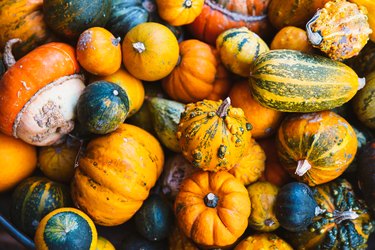
Pumpkins are most often associated with Halloween and Thanksgiving. But this delicious squash can help support your weight-loss goals too. Pumpkin stir-fries, pumpkin soup and even pumpkin weight-loss smoothies can help you shed those extra pounds and improve your health.
Tip
There aren't any studies that specifically attribute weight loss to pumpkin consumption. However, pumpkin is a very nutritious food that can be easily incorporated into most diets.
Video of the Day
Pumpkin Consumption and Healthy Diets
The current Dietary Guidelines for Americans recommend that people consume 2 cups of fruit and 2.5 cups of vegetables each day. Yet, according to the USDA Economic Research Service, most Americans only consume about half this amount of fruits and vegetables on a daily basis.
Video of the Day
If you're trying to increase your intake of fruits and vegetables, pumpkin is a particularly healthy choice. There's no specific pumpkin diet for weight loss, but this orange squash is rich in a variety of essential nutrients and can be easily integrated into many diets. High-carb, low-carb, high-protein and plant-based diets can all incorporate pumpkin in one way or another.
If you want to eat more pumpkin, try one or more of these LIVESTRONG.com recipes for Pear, Pumpkin and Pine Nut Salad, Pumpkin Hummus or Turkey Pumpkin Soup. You can even consume pumpkin weight-loss smoothies or a protein smoothie, like our Pumpkin Protein Smoothie, if you're following a high-protein diet.
Read more: 16 Diet-Friendly Healthful Carbs
Pumpkin Nutrition Facts
According to the USDA, each cup (245 grams) of cooked pumpkin contains 49 calories, 0.2 grams of fat, 1.8 grams of protein and 12 grams of carbohydrates. A total of 2.7 grams of these carbohydrates come from dietary fiber. Pumpkin has a variety of vitamins and minerals as well, including:
- 8 percent of the daily value (DV) for iron
- 12 percent of the DV for potassium
- 5 percent of the DV for magnesium
- 6 percent of the DV for phosphorus
- 25 percent of the DV for copper
- 5 percent of the DV for zinc
- 9 percent of the DV for manganese
- 78 percent of the DV for vitamin A
- 6 percent of the DV for vitamin B1 (thiamin)
- 15 percent of the DV for vitamin B2 (riboflavin)
- 6 percent of the DV for vitamin B3 (niacin)
- 10 percent of the DV for vitamin B5
- 6 percent of the DV for vitamin B6
- 6 percent of the DV for vitamin B9 (folic acid)
- 13 percent of the DV for vitamin C
- 13 percent of the DV for vitamin E
Pumpkin also contains small amounts of other essential nutrients, like calcium, selenium and vitamin K.
Consuming Pumpkin for Weight Loss
Eating pumpkin can be integrated into a healthy, balanced diet to help you lose weight. However, the amount of pumpkin you can consume will depend on the type of diet you're following.
Consider your diet and its restrictions. Many diets can help with weight loss. For instance, certain diets, like the high-carbohydrate diet, want you to primarily consume low-fat, plant-based foods. Other diets, like low-carb and ketogenic diets, restrict your carbohydrate consumption.
According to the Mayo Clinic, most low-carb diets restrict carbohydrate intake to between 20 and 60 carbohydrates per day. However, carbohydrate restriction only refers to net carbs. The Mayo Clinic states that net carbs are essentially carbohydrates minus dietary fiber, or carbohydrates minus both dietary fiber and sugar alcohols.
A cup of cooked pumpkin has 9.3 net carbs. This means that strict low-carb dieters would be limited to around 2.5 cups per day, assuming that no other fruits, vegetables or other plant-based products were being consumed that day. It's much healthier to consume a varied diet, so substantial pumpkin consumption and strict low-carb diets are consequently not very compatible.
In contrast, plant-based diets and high-carbohydrate diets (like the Okinawa diet) would allow you to consume as much pumpkin as you want each day. These diets focus on reducing your fat intake rather than your carbohydrate intake — which isn't an issue given the minimal amount of fat in pumpkin.
You should also consider that a pumpkin is composed of more than just its flesh. You can also consume the pumpkin's seeds if you want to increase your protein intake — and have a tasty snack. The USDA states that an ounce of roasted pumpkin seeds have 8.5 grams of protein. They're also rich in minerals like iron, magnesium, phosphorus, zinc, copper and manganese.
- USDA: "Roasted Squash and Pumpkin Seeds (Unsalted)"
- Mayo Clinic: "Low-Carb Diet: Can It Help You Lose Weight?"
- USDA Economic Research Service: "Americans Still Can Meet Fruit and Vegetable Dietary Guidelines for $2.10-$2.60 per Day"
- Mayo Clinic: "Carbohydrates: How Carbs Fit Into a Healthy Diet"
- USDA: "Cooked Pumpkin"
- Health.gov: "Dietary Guidelines for Americans, 2015-2020: Chapter 1. Key Elements of Healthy Eating Patterns"